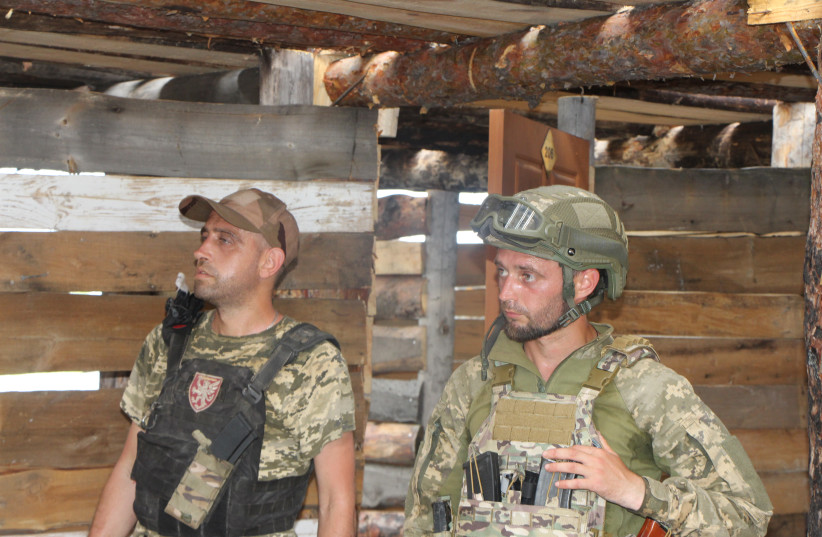At a training facility in the Bakhmut region this week, as the war raged a few kilometers away, soldiers of the Ukrainian Army’s 80th Air Assault brigade took part in a training exercise designed to hone their combat skills. It is part of the routine of war for the unit. ‘Rest’ days don’t mean what they sound like. ‘When we’re away from the frontline, even after one or two days, you start to lose skills. So we practice every day,’ says 23-year-old Oleksandr, one of the soldiers taking part in the training.
The 80th Air Assault Brigade is one of the Ukrainian Army’s oldest formations, and it has been among the most active since the current round of war between Ukraine and Russia commenced in February 2022. The unit has been particularly engaged in the bitter and still not completed battle for the town of Bakhmut, in the Donbas.
In the course of 2023, the Russian invading forces turned this formerly nondescript Donbas town into a symbol. Wave after wave of Russian fighters from the Wagner PMC, and from the regular Russian forces hurled themselves against the Ukrainian defenses in an ongoing effort to take the town.
The Ukrainian 80th Brigade was among the forces that held them off through the long months. Wagner declared victory over the ruins of Bakhmut in late May. But with the commencement of the Ukrainian counter-offensive in early June, the town and the region are once more in play, with the Ukrainians slowly moving forward and talk of a possible encirclement of the Russians. Wagner, of course, is no longer in the game.
Designations such as ‘air assault brigade’ suggest to Western ears a highly trained infantry force. The 80th was once that, and it is still built around a seasoned, experienced NCO corps. Many of the fighters taking part in the training exercise in the Bakhmut region this week, however, were newcomers to war when they were mobilized last February. They have had to learn fast.

“I got mobilized, and trained for forty days, ‘ said Oleksandr. ‘The training wasn’t great. The knowledge I got was from the fighting itself, and from my brothers here.’
Watching the fighters taking part in the drill, their commitment, and easy familiarity with their weapons was obvious. The fatigue, and the distant looks behind the jokes and the humor were obvious too, as soon as they stopped for rest. This group of men, with only 40 days’ training each before being sent into the maelstrom of the Bakhmut fight, currently have more experience in conventional combat than any comparable force, in any Western army.
Nazar, 27, a former solar panels engineer from central Ukraine, sat by the training area, toying with a grenade from his pouch as he spoke to us about the Bakhmut fighting.
“Yeah, no prior experience. I trained for a month in Zhitomir, then we went into the fighting in the Bakhmut region. We fought Wagner, and some Russian army forces too. “
So what was his impression of Wagner?
“My impression is that they weren’t bad at all. Often, they didn’t have flak jackets. The Russians would open up with artillery in the morning. Then Wagner would just come forward. A lot of them died. The closest fight I had with them was at about ten meters. They were coming forward with Kalashnikovs. About 15 people. I can't describe the feeling, really. A lot of adrenaline. I didn’t even understand what I was doing. We used up about 1800 machine gun rounds in an hour.
Between Wagner and the others, there was a huge difference. Wagner was prepared better, they had proper trenches. Wagner are fighting with the feeling that either we’ll kill them, or if they go back, then their own guys will kill them. We didn’t capture Wagner people. Regular soldiers, yes.”
Away from the exercise area, in a wooden log hut, NCOs of the brigade model scenarios based on their observations of recent Russian tactical behavior, and discuss possible responses to these. Oleh, a burly 42-year-old company sergeant major from the center of the country, ran the discussion as we sat and watched.
‘Taking back 100 meters of our homeland is a big distance too,’ Oleh told us afterwards, in response to those who say the counter-offensive is moving too slowly. “It means a lot for Ukraine.”
The 80th will be returning to the Bakhmut front when their short period of ‘rest’ is completed. Their opposite numbers in Wagner are gone from the area now, of course. Only the Russian regular army remains. Many think the fate of the Ukraine war will be decided in the coming period. It is units like the 80th Airborne Brigade, mobilized civilians who have come through a baptism of fire the like of which Europe has not seen for 70 years, who will be prosecuting the issue in the remaining summer weeks ahead.
